
Cyprus President Nicos Anastasiades
Both leaders held bilateral talks over issues of strategic importance.
Relations between India and Cyprus have been traditionally very close and friendly.
After the Turkish invasion of Cyprus in 1974, India gave unstinted support to Cyprus' successful efforts to gain international recognition for the Government of Nicosia, as the sole legal representative of the whole of Cyprus. India supports the sovereignty, unity and territorial integrity of Cyprus.
India has consistently and unwaveringly supported a peaceful resolution of the Cyprus problem in accordance with the relevant UN Security Council resolutions. India supports the sovereignty, unity and territorial integrity of Cyprus.
After the PM's meeting, MEA spokesperson Vikas Swarup tweeted: "Mediterranean warmth with traditional friend Cyrpus."
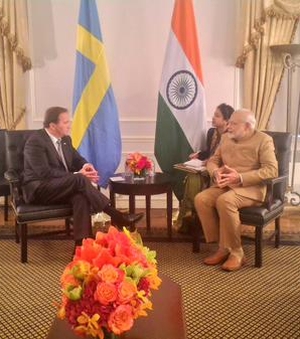
Sweden Prime Minister Stefan Lofven
Ties between India and Sweden were established in 1949 and are founded on shared democratic values. A number of bilateral ministerial visits have taken place in the last five years which have promoted cooperation in a number of important areas. Parliamentary contacts have also gathered momentum, adding further substance to the relations between the two democracies.
Mutual economic interests have emerged as the driver of the relationship with growth in bilateral trade, which crossed US $2 billion in 2009-10 and increased to US $2.4 billion in 2014-15. Two-way investments are also expanding.
After the PM's meeting, MEA spokesperson Vikas Swarup tweeted: "Showing the way in Human Development. PM @narendramodi meets Stefan Lofven, Prime Minister of Sweden."
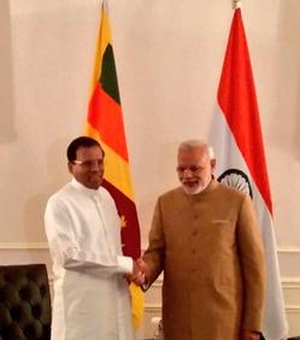
Sri Lanka President Maithripala Sirisena
"Continuing the momentum. After PM @RW_UNP visits India, PM @narendramodi meets with President Sirisena of Sri Lanka," MEA spokesperson Vikas Swarup tweeted.
The relationship between India and Sri Lanka is more than 2,500 years old. Both countries have a legacy of intellectual, cultural, religious and linguistic interaction. In recent years, the relationship has been marked by close contacts at all levels. Trade and investment have grown and there is cooperation in the fields of development, education, culture and defence.
Both countries share a broad understanding on major issues of international interest. In recent years, significant progress in implementation of developmental assistance projects for Internally Displaced Persons (IDPs) and disadvantaged sections of the population in Sri Lanka has helped further cement the bonds of friendship between the two countries.
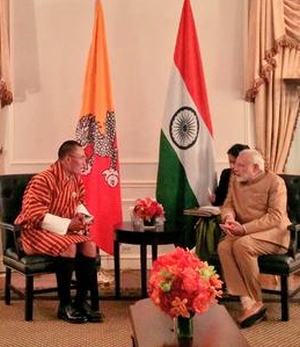
Bhutan Prime Minister Tshering Tobgay
"Strengthening the deep rooted ties of friendship with Bhutan. PM @narendramodi meets PM @tsheringtobgay," tweeted Swarup.
Diplomatic relations between India and Bhutan were established in 1968 with the appointment of a resident representative of India in Thimphu. The basic framework of India-Bhutan bilateral relations is the Treaty of Friendship and Cooperation signed in 1949 between the two countries, which was renewed during the visit of King Jigme Khesar Namgyel Wangchuck to India in February 2007.
The renewed India-Bhutan Friendship Treaty not only reflects the contemporary nature of the relationship between both nations but also lays the foundation for their future development in the 21st century.
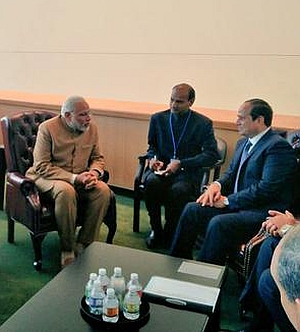
Egypt President Abdel Fattah el-Sisi
This was the first meeting that Prime Minister Modi had with the Egyptian President, adding that it was an important occasion for the two leaders to exchange views.
"The discussions were on counter terrorism and counter radicalisation and on the economic and business cooperation between India and Egypt," said Swarup.
"In the context of economic and business cooperation, the President of Egypt referred to the new Suez Canal project. As you know, the extension of the Suez Canal was opened very recently and from India, (Union Road, Transport and Highways) Minister Nitin Gadkari had gone as a representative of the Prime Minister to participate in those celebrations. And there was a discussion on how this project offered investment opportunity for India," he added.
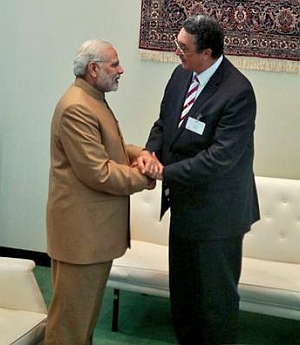
St Lucia Prime Minister Kenny Davis Anthony
"Continuing Caribbean collaboration. PM @narendramodi has pull aside with Kenny Davis Anthony, PM of St. Lucia," MEA spokesperson Vikas Swarup tweeted.
There was a brief discussion on whether there would be a possibility for both leaders to meet at the forthcoming Commonwealth Heads of Government Summit which will be held in Malta later this year.
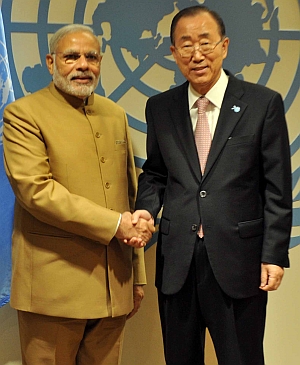
UN Secretary-General Ban Ki-moon
Modi and the UN Secretary-General discussed sustainable development, Security Council reform and UN peacekeeping operations ahead of the Prime Minister's speech at the summit.
With India among the countries providing the highest number of peacekeeping troops, PM Modi said nations sending their soldiers must have a say in peacekeeping missions.
The two leaders also had detailed discussions on climate change. Modi said currently there is a huge trust deficit among developed and developing nations as he stressed on the positive aspect of climate change.
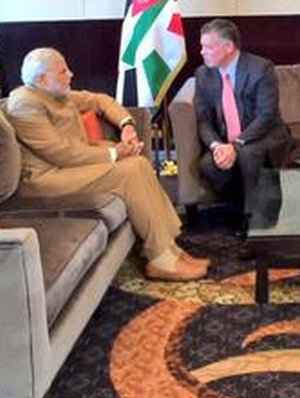
King Abdullah of Jordan
In their bilateral meeting, Prime Minister Modi discussed various issues, especially giving priority to the challenges that both nations faced when it came to terrorism, and praised the King's strong leadership in the fight against the same.
PM Modi specifically referred to the long pending proposal for the comprehensive convention on international terrorism and said the time had now come for the international community to speak with one voice on this important issue and adopt this global convention.
The Prime Minster also thanked the King for the support that Jordan had provided when Indian citizens were trapped in Iraq and Syria and had to be evacuated.
King Abdullah reiterated that he valued India as a partner and wanted to increase security and economic cooperation.
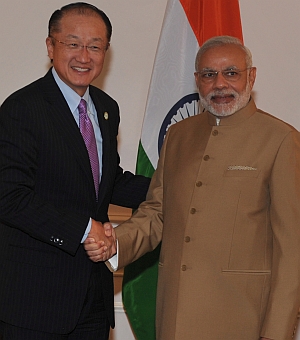
World Bank President Jim Yong Kim
World Bank president Dr Jim Yong Kim praised the progress made in the ' Swachh Bharat' and the 'Clean Ganga Programme' during his meeting with Prime Minister Modi.Dr Kim also acknowledged that what was happening in India was actually very different from what had happened in other countries and that he maintained that the World Bank wanted to be strong partner as India moves forward on these targets.
There was also a discussion on the governance structure of the World Bank. PM Modi said that he had always supported strengthening of global governance and reform of the institution of global governance, but it was a fact also that a country like India was not represented in these structures. So this needed to change.